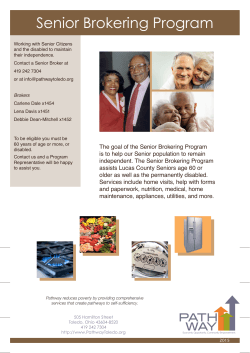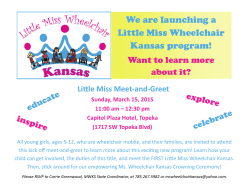
Facilitator: Jacob Adams, Festival Project Manager
Facilitator: Jacob Adams, Festival Project Manager The following groups of people may be covered under the Equality Act: Wheelchair users People with mobility impairments Vision impaired people Hard of hearing people Deaf people People with learning disabilities People with mental health conditions Progressive conditions such as Cancer or HIV People with hidden impairments Over 11 million people live with an impairment in the UK today. True or False? True 17% of disabled people were born with their impairments. True or False? True Between 15 to 20% of disabled people in the UK are wheelchair users. True or False? False There are an estimated 20,000 people aged 0-25 who are blind or partially sighted in the UK. True or False? False About two million people in the UK use hearing aids. True or False? True Disabled people make up 5% of the total live music attendees in England. True or False? False Disabled adults attending classical concerts grew by 280,000 to 1.1m between 2008 and 2012. True or False? False We are meeting to discuss plans for a new festival, to be spread over 3 local venues: Park Church Theatre What opportunities and potential issues does each venue present in terms of access for audiences, staff and performers? What can you do to capitalise upon or address these factors? Expect sell-out concerts Unamplified classical music and artist conversations Existing pew seating Expect long queues as seating will be first-come first-serve Existing hearing loop with a single mic used for sermons Main entrance – 5 steps Side entrance – 1 step No accessible toilet No car park Small amplified stage Crowds expected Park has some toilet facilities Stall traders + food vans Purpose-built bar Finale event with people standing around stage No parking within park Some spoken word performances on stage Some routes are stepped Series of acoustic concerts and spoken word shows Normally offers range of access facilities Expect to sell out Small capacity Has own website Has links with local disabled people’s organisation Plan to offer rare tours of the theatre before shows New accessible entrance potentially blocked by customers parking when busy. Accessible information Accessible booking system Personal Assistant ticket at no additional cost Viewing platforms and Getting to the event areas Box office or wristband Bars and traders exchange Backstage and stage Accessible toilets access Level access and physical access Signage Access to the performance Emergency Evacuation Plans Staff can describe access Disability Awareness Training Staffing and volunteers A customer contacts your box office to let you know his circumstances have changed. When he bought his tickets he used crutches to get about and had no requirements, but in the last few weeks he has had a relapse and now he uses a wheelchair. He is coming with six friends, and wants to be able to sit with them as previously planned. The concert is sold out and the spaces for wheelchair users are fully booked. How do you respond to him on the phone? What options are available to you? What steps could you have taken to pre-empt this issue? You are setting up a new festival and are reviewing your policies and practices around access for disabled people. You wish to offer a free ticket for use by personal assistants whereby the disabled person buys their ticket and is then able to request a complimentary ticket. What issues do you need to consider? What needs to be made clear to your staff and to your disabled customers? How might you communicate effectively to both groups? A performer who is hard of hearing arrives at your venue and requests some help. You are having some difficulty in communicating with her. What do you do? What could you have done in advance? A customer is making involuntary noises during a performance, you think other customers are finding this disturbing and the conductor has looked at this person several times. What do you do? What could you have done in advance? Lauren is visually impaired and applies to be a steward outside an evening concert in a Church. She is partially sighted and has some useful sight in daylight but her sight decreases at night time or in low light conditions. What provision might you put in place in the physical environment where Lauren will be working? What else might be useful to Lauren to be able to carry out the role? Paul has learning disabilities and applies to join your steward team this year. He has no previous event experience. What steps do you need to take to ensure that Paul understands his role? What might be necessary to enable Paul to carry out his role effectively? 1. 2. 3. Conduct an access survey of your venues Add an access information page to your website Contact local disability groups and organisations Get in touch! jacob@attitudeiseverything.org.uk 020 7383 7979
© Copyright 2025




















